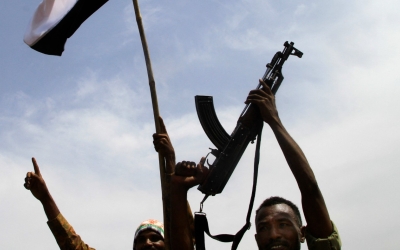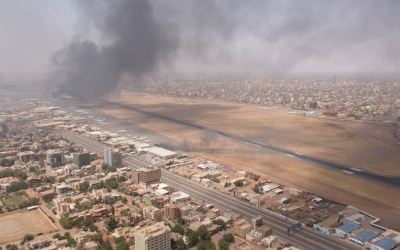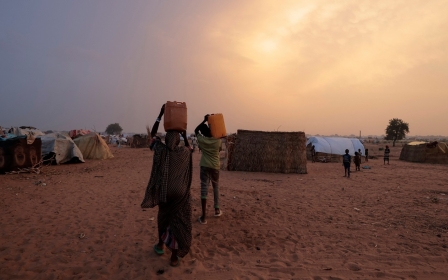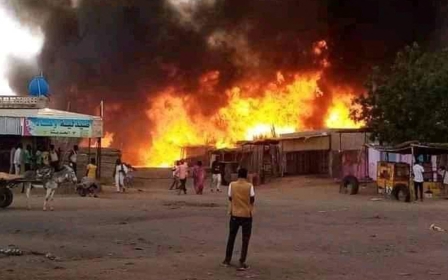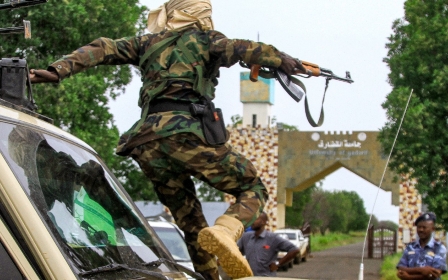Sudan: Fighters from both warring sides seek refuge in South Sudan
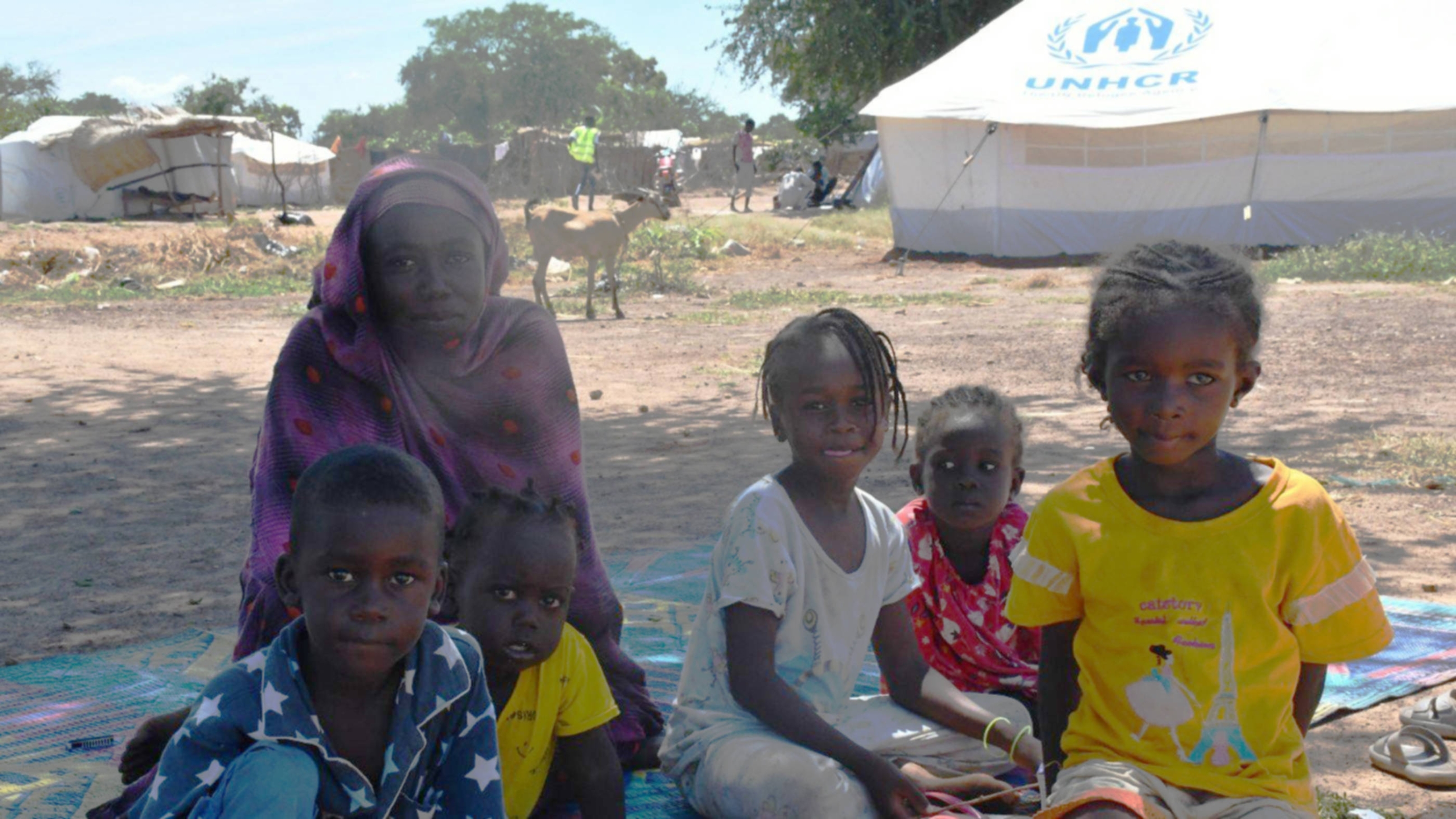
Sitting outside his tent in a refugee camp in South Sudan, Mustafa Alnur is talking about the moment he abandoned his life as a soldier in neighbouring Sudan.
A Sudanese Armed Forces (SAF) commander selected to head an attack on enemy positions in Nyala, the capital of South Darfur state, the junior officer chose to flee his homeland and become a refugee, rather than continue playing a part in Sudan’s deadly war.
“The wars we are fighting are bloody and many innocent people are being killed,” Alnur told Middle East Eye at the Wedwiel refugee settlement in Northern Bahr el Ghazal state, South Sudan.
If he had stayed in Sudan as an army deserter, he might have been killed, Alnur said.
“I made my decision and chose to abandon the army at the risk of my life, because if I had stayed a part of it, my conscience would trouble me for ever.”
Stay informed with MEE's newsletters
Sign up to get the latest alerts, insights and analysis, starting with Turkey Unpacked
Fighters from both the army and its enemy, the Rapid Support Forces (RSF) paramilitary, are fleeing the horror and carnage of the front lines and joining the 1.2 million people who have crossed Sudan’s borders since the war began on 15 April.
At Wedwiel, 9,113 people had been registered as refugees, as of the beginning of October. Interviewed by MEE, several of them described the killing of innocent civilians, destruction of property, looting, rape and torture taking place back home in Sudan.
Haunted by war
In the camp, dotted with white UNHCR tents, Alnur tries to keep a low profile, preferring to be by himself or in the company of people from his area.
“I don’t know what people think, but whatever happened out there isn’t my own doing. I therefore prefer to sit alone, sometimes spending hours in my tent here,” he said.
“If I come out, I sit around with people who also came here from my home area. We comfort each other and try to tell each other that the problem has affected all of us.”
'We do not need to continue fighting one another over nothing'
- Mustafa Alnur, former Sudanese army soldier
Fighting has been particularly fierce in Darfur, where Alnur served. The vast western region, which has been in a state of conflict for most of the 21st century, is the homeland and power base of the RSF, which is led by Mohamed Hamdan Dagalo, the general better known as Hemeti.
Hailing from a Chadian family, Hemeti grew up in Darfur, and made his name there as a commander in the Janjaweed, a force charged by the Sudanese government with violently quelling rebellions in the first decade of the century.
Victims of violence who have escaped Darfur have previously spoken to MEE about witnessing the mass slaughter of the local Masalit people by the RSF and its allied Arab militias. The RSF has just taken Nyala from the army, and now controls almost the entirety of Darfur.
These are the kinds of scenes Alnur was looking to escape.
“I am now a refugee and I will take time to see what I can do for my future, but what I can say is that we do not need to continue fighting one another over nothing,” he told MEE.
Like Alnur, Mohamed Haroun Khalifa also deserted the front line in Sudan, arriving at Wedwiel on 23 July. But unlike Alnur, Khalifa was fighting for the RSF.
“To me, I see that this is not good. We are fighting one another for nothing,” Khalifa said. “The innocent people who are dying, those are the people we are mandated to protect.
“The style of fighting is only adding to people’s suffering. Soldiers going to war do not look for front lines in the residences of civilians because you invite attacks on them,” Khalifa told MEE.
Across Sudan, fighters have hidden in people's homes and deadly fighting has taken place in residential streets.
“They are our relatives, they are our brothers and sisters and our children, and to involve them in such a terrible war is not right,” Khalifa said.
The former RSF fighter has met a few people in the camp who he knew back home, those who, like him, fled their home. Together they talk about the war and about what has befallen their country.
“Like, two, three or four years ago, no one would have thought Sudan would go this bad,” Khalifa said. “We are always sitting together: we eat together, we talk and we pray that this war ends and everyone can go back home,” he said.
“It may not be the same Sudan we will return to, but at least we want to return home in peace one day.”
A farewell to arms
The Wedwiel refugee settlement welcomes anyone, as long as they obey the principles of refugee status, Julius Taban Philip, assistant commissioner for refugees at the South Sudan Commission for Refugees' Affairs, told MEE.
“Some of them are definitely soldiers, but our policy on refugees is that once you have left the gun, once you have run, you are now taken as a refugee and must maintain your civilian character,” Philip said.
'They are now talking freely with each other and even playing football and having tournaments'
- Julius Taban Philip, South Sudan Commission for Refugees' Affairs
“We tell them on arrival that if you have a uniform or a gun, please remove it. We have even got uniforms of decorated officers,” he said. “They have come to South Sudan, they are all refugees and their differences should end there. Once they come here, we are going to make efforts at least to educate them so that they stay together.”
While some refugees told MEE that the presence of the former fighters in their midst created tension, Philip said the stakeholders working with the refugees are on the lookout for any issues.
“This division is there, but we are trying to mitigate it,” Philip said. “Whoever we notice talking about division, we call him up and then talk to him in a very friendly way. We tell them, 'You are all Sudanese, forget about these things,' but it is noticeable that it’s there in their hearts.”
This is also the case when it comes to differences between those who fought on opposing sides.
"They are now realising that whatever motives they had to continue politicking and taking sides can no longer work," Philip said.
"They are now talking freely with each other and even playing football and having tournaments."
Recently, former RSF fighters and former army fighters played together in a football game against their South Sudanese hosts.
"The host community won, but everyone was happy," Philip said. "We are always telling them that now we don't need to divide you, and that if you return home to Sudan, stay as one people there."
Many young men have fled Sudan after being forcibly conscripted into fighting groups.
“There are so many young ones who, when you ask, will say we are running because of the war, that they are running from conscription,” Philip said. “Hemeti wants to take people into the RSF and the other side may also want the same, and so they are running here.”
Refugees continue to arrive at Wedwiel, although the roads out of Sudan are fraught with peril, Garang Mayuen Athian, a protection officer with the UNHCR, told MEE.
“Refugees are continuing to arrive with some difficulties because of the security situation on the Sudan side, where there is no active security,” Athian said.
“Currently, there are a lot of roadblocks and a lot of challenges, including torture and looting, that are facing refugees and returnees trying to come here.”
Middle East Eye delivers independent and unrivalled coverage and analysis of the Middle East, North Africa and beyond. To learn more about republishing this content and the associated fees, please fill out this form. More about MEE can be found here.


